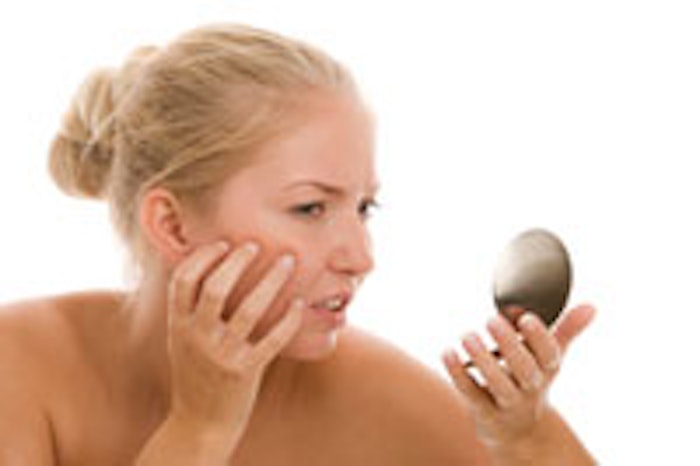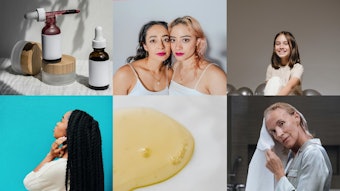
When a woman in her 30s or 40s develops acne, she may reach for the same remedies she relied on decades ago to treat pimples as a teenager—over-the-counter acne cream and some cover-up to camouflage the blemishes. But that's a mistake because adult acne is different from teen acne, according to Whitney Bowe, MD, a dermatologist with Advanced Dermatology in New York and a clinical assistant professor of dermatology at SUNY Downstate Medical Center. While many factors contribute to adult onset acne, including hormones, diet and, yes, stress, research has also shown that oxidative stress, or inflammation, is one of the culprits. In a 2012 study published in the Journal of Drugs in Dermatology, Bowe, the lead author, found that inflammation and oxidative stress—caused by free radicals—might play a role in causing acne, a theory that challenges the conventional wisdom that plugged follicles are the main instigator.
In an analysis of several studies, Bowe found that decreased antioxidant levels are commonly found in adults with acne. (Blood levels of antioxidant vitamins such as A, C and E are actually lower in people suffering from acne as compared to people who have clear skin). Studies have also found that people with acne have a higher burden of oxidative stress, as indicated by certain markers in the blood.
Bowe explains that antioxidants can be delivered directly onto the skin as a serum, cream or lotion, or they can be indirectly delivered to the skin after going through the mouth and undergoing digestion. In other words, clients can incorporate more antioxidant-rich foods or beverages in your diet. For example, antioxidant-rich green tea can be found in a number of over-the-counter creams, but can also be sipped hot or cold. "Treating acne with antioxidants may address acne while at the same time reducing some of the signs of aging, such as fine lines and wrinkles," she says. "This makes antioxidants especially attractive for the woman who suffers from acne and also sees fine lines beginning to form."
About acne
Acne is the most common skin condition in the United States, and research indicates that an increasing number of adults—particularly women—experience acne. A November 2012 study of nearly 3,000 women at Massachusetts General Hospital in Boston found that 45% of women 21-30 experienced acne; that number dropped to 26% among 31-40-year-olds and 12% in women 41-50.
Acne is characterized by chronic inflammation of the hair follicles and oil glands. Adults with acne may have pimples as well as other blemishes, such as comedones (whiteheads and blackheads), nodules, cysts and solid round growths known as papules. Acne is most common on the face but it can also appear elsewhere on body, including the back, chest, neck, shoulders, upper arms and buttocks, according to the American Academy of Dermatology.
Adult acne can be embarrassing and upsetting, leading to both depression and anxiety, says Bowe. "It can be perplexing and frustrating when the remedies you used to turn to aren't effective," she says. "The good news is that after treatment many women feel more confident and it boosts self-esteem."
Bowe offers tips for preventing and treating adult acne
"Almost all cases of acne in adults can be treated and, in some cases, it can even be prevented," says Bowe. "It's crucial to address both periodic breakouts and chronic acne because, over time, acne can lead to scarring or dark spots." Following are possible recommendations for clients struggling with adult acne.
- After cleansing your skin in the morning, apply an antioxidant serum under your sunscreen, or find a sunscreen that contains antioxidants along with broad-spectrum UVA and UVB-blocking ingredients. "Even though some people believe that the sun can help control acne, exposure to the sun's harmful rays can cause skin cancer and premature wrinkles. If you think your acne benefits from exposure to the sun, ask your dermatologist about light-based treatments that are just as effective for acne but safe," says Bowe.
- Try to add antioxidants to your diet. "The more deep colors you see on your plate, the better. Look for deep greens such as kale or spinach, bright reds such as tomatoes and strawberries, and oranges such as salmon and squash."
- Don't smoke, which can increase your exposure to free radicals and lead not only to accelerated signs of aging such as wrinkles, but also to cancer.
- Talk to an esthetician and/or dermatologist if you have chronic acne that isn't responding to over-the-counter therapies. Depending upon the type, location and severity of symptoms, additional treatments may include antibiotics, oral contraceptives and other medications, as well as laser and light therapy, treatments shown effective in clients with acne.











